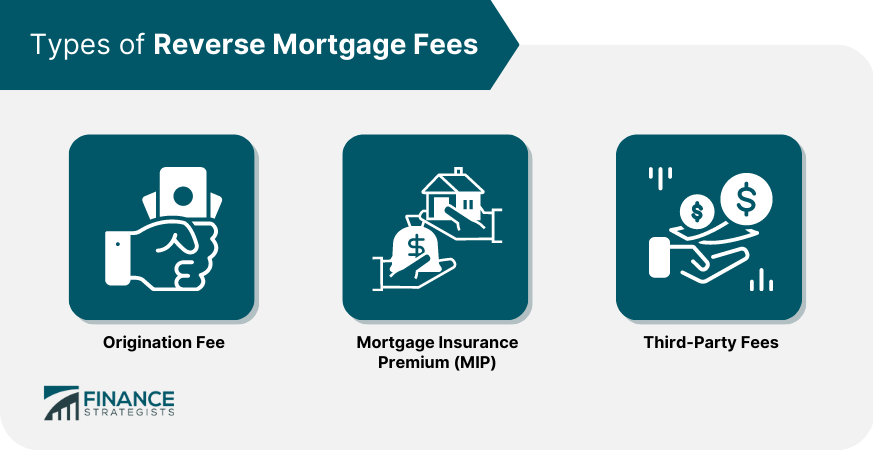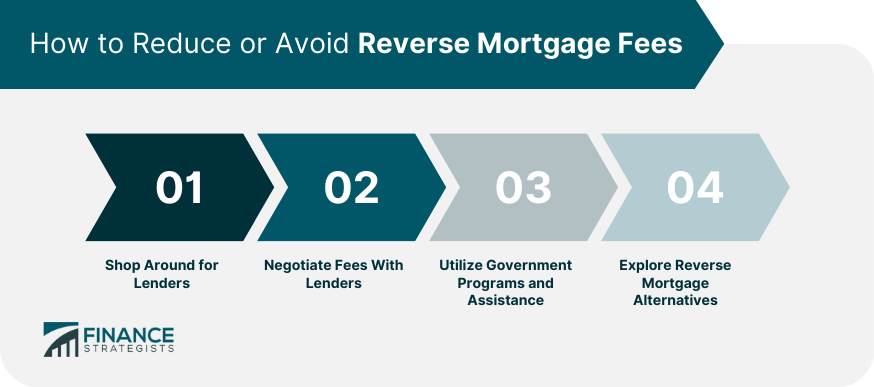Reverse mortgage fees refer to the charges associated with taking out a reverse mortgage, including origination fees, mortgage insurance premiums, appraisal fees, servicing fees, and closing costs. These fees are deducted from the loan proceeds and can vary depending on the lender and location. It's crucial to understand these fees before committing to a reverse mortgage. Reverse mortgage fees can be broadly categorized into origination fees, mortgage insurance premiums (MIP), third-party fees, interest rates, loan servicing fees, and closing costs. Each of these fees plays a specific role in the reverse mortgage process. The lender charges the origination fee to cover the costs associated with processing, underwriting, and closing the reverse mortgage. This fee is typically calculated as a percentage of the home's value or the maximum claim amount, whichever is less. The origination fee may vary depending on factors like the lender, borrower's credit history, and the complexity of the loan process. Borrowers can compare different lenders to find the best deal. MIP is a fee required by the Federal Housing Administration (FHA) to insure reverse mortgages under the Home Equity Conversion Mortgage (HECM) program. There are two types of MIP: initial and annual. The initial MIP is a one-time fee.The annual MIP is an ongoing fee and charged monthly. The MIP is a mandatory fee for all HECM reverse mortgages. However, its amount may vary depending on the home's value, the maximum claim amount, and the outstanding loan balance. Third-party fees cover various services required during the reverse mortgage process. These fees are paid to independent professionals who provide essential services such as appraisals, title searches, and inspections. An appraisal determines the current market value of the property. The cost of an appraisal typically depends on the property's size, location, and complexity. Title insurance protects the lender against potential ownership disputes or liens on the property. The cost of title insurance depends on the property's value and the insurance provider. Inspections are sometimes required to assess the property's condition and identify any potential repair needs. The cost of an inspection varies based on the property type and inspection scope. Lenders may charge a fee to obtain the borrower's credit report. This fee typically helps the lender assess the borrower's creditworthiness and financial history. The escrow company charges an escrow fee for managing the disbursement of funds during the reverse mortgage process. This fee depends on the company and the complexity of the transaction. Local government offices charge recording fees for registering the reverse mortgage in public records. These fees vary based on the location and the number of pages to be recorded. A survey fee may be required to determine the property's exact boundaries and identify potential encroachments. The cost of a survey depends on the property's size and location. Document preparation fees cover the cost of preparing and processing loan documents. These fees depend on the lender and the complexity of the loan process. Interest rates play a crucial role in determining the total cost of a reverse mortgage. Borrowers can choose between fixed-rate and adjustable-rate reverse mortgages, each with its pros and cons. Fixed-rate reverse mortgages offer the advantage of a consistent interest rate throughout the life of the loan, providing predictable monthly payments. However, they typically require a lump-sum disbursement, which may not be suitable for borrowers needing ongoing funds access. Fixed interest rates are influenced by market conditions, the lender's offerings, and the borrower's credit history. Comparing rates from different lenders can help borrowers secure a competitive rate. Adjustable-rate reverse mortgages offer more flexibility in payment options, such as monthly installments, a line of credit, or a combination of both. However, interest rates may change over time, making it challenging to predict future loan costs. A combination of an index and a margin determines adjustable interest rates. The index reflects market conditions, while the margin represents the lender's markup. Commonly used indexes include the London Interbank Offered Rate (LIBOR) and the Constant Maturity Treasury (CMT) rate. Loan servicing fees cover the costs of managing and administering the reverse mortgage, such as processing payments and providing customer support. The lender charges loan servicing fees or a third-party servicer to cover the costs associated with managing the reverse mortgage. A monthly servicing fee is charged as a fixed amount added to the loan balance each month. A set-aside servicing fee is an upfront lump sum collected at closing and set aside to cover future servicing costs. This fee is less common and is typically charged when the borrower has a higher risk of default. Loan servicing fees may vary depending on the lender, loan type, and borrower's credit history. Comparing different lenders can help borrowers find a competitive servicing fee. Closing costs include various fees and charges paid at the time of closing the reverse mortgage. Closing costs are a collection of fees required to finalize the reverse mortgage transaction. These fees cover services the lender, third parties, and government agencies provide. Closing costs typically include origination fees, mortgage insurance premiums, third-party fees, and any pre-paid interest or initial loan servicing fees. These costs can vary significantly based on factors such as the lender, property value, and borrower's credit history. Closing costs are influenced by several factors, including the lender's fees, the borrower's creditworthiness, the property's value, and the complexity of the transaction. Borrowers can compare closing costs from different lenders to find the best deal. Borrowers have the option to finance fees into the loan or pay them out-of-pocket, each with its pros and cons. When financing fees into the loan, borrowers add the costs to the loan balance, spreading them out over time. This option can be helpful for borrowers with limited cash reserves but may result in higher overall loan costs due to accruing interest on the fees. Paying fees out-of-pocket allows borrowers to avoid accruing interest on the fees, reducing the overall cost of the loan. However, this option requires upfront cash, which may only be feasible for some borrowers. The best payment method depends on the borrower's financial situation and preferences. Financing fees can benefit those with limited cash reserves while paying out-of-pocket fees can save money in the long run. There are several strategies borrowers can employ to reduce or avoid reverse mortgage fees, including shopping around for lenders, negotiating fees, and exploring government programs or alternatives. Comparing different lenders can help borrowers find competitive rates and fees. Borrowers should request detailed fee breakdowns from multiple lenders to make an informed decision. Some lenders may be willing to negotiate fees or offer discounts to secure a borrower's business. Borrowers should be prepared to discuss their financial situation and provide reasons for requesting reduced fees. Some state and local governments offer assistance programs for seniors, such as property tax deferrals or exemptions. These programs can help reduce the overall cost of homeownership and may indirectly impact reverse mortgage fees. Borrowers should also explore alternatives to reverse mortgages, such as home equity loans, home equity lines of credit (HELOCs), or downsizing to a smaller, more affordable home. These options offer lower fees and more favorable terms. Reverse mortgage fees can be a significant factor in the overall cost of a reverse mortgage. It is important for borrowers to understand the types of fees associated with reverse mortgages, including origination fees, mortgage insurance premiums, third-party fees, interest rates, loan servicing fees, and closing costs. Borrowers can reduce or avoid these fees by shopping around for lenders, negotiating fees, utilizing government programs and assistance, and exploring alternatives to reverse mortgages. By taking the time to understand and minimize these fees, borrowers can make informed decisions about their financial futures and ensure they receive the maximum benefits from their reverse mortgages.What Are Reverse Mortgage Fees?
Types of Reverse Mortgage Fees
Origination Fee
Purpose and Calculation
Factors Affecting the Origination Fee
Mortgage Insurance Premium (MIP)
Purpose and Benefits
This insurance offers protection to both borrowers and lenders. It ensures that borrowers receive their loan proceeds, and lenders are protected from any potential losses due to borrower default or property value decline.Initial and Annual MIP Calculations
Factors Affecting MIP
Third-Party Fees
Appraisal Fee
Title Insurance
Inspection Fee
Credit Report Fee
Escrow Fee
Recording Fee
Survey Fee
Document Preparation Fee

Interest Rates and Reverse Mortgage Fees
Fixed-Rate Reverse Mortgages
Pros and Cons
Factors Affecting Fixed Interest Rates
Adjustable-Rate Reverse Mortgages
Pros and Cons
Factors Affecting Adjustable Interest Rates
Loan Servicing and Reverse Mortgages Fees
Definition and Purpose
Types of Loan Servicing Fees
Monthly Servicing Fee
Set-Aside Servicing Fee
Factors Affecting Loan Servicing Fees
Closing Costs and Reverse Mortgage Fees
Definition and Purpose
Inclusion of Various Fees in Closing Costs
Factors Affecting Closing Costs
Methods of Payment for Reverse Mortgage Fees
Financing Fees Into the Loan
Paying Fees Out-of-Pocket
Pros and Cons of Different Payment Methods
How to Reduce or Avoid Reverse Mortgage Fees
Shop Around for Lenders
Negotiate Fees With Lenders
Utilize Government Programs and Assistance
Explore Reverse Mortgage Alternatives

Conclusion
Reverse Mortgage Fees FAQs
A reverse mortgage fee is a cost that borrowers pay to the lender for the services associated with the reverse mortgage loan. These fees include origination, appraisal, and mortgage insurance premiums.
The cost of reverse mortgage fees varies depending on the lender and the specific terms of the loan. On average, borrowers can expect to pay between 2% to 5% of the loan amount in fees.
Yes, reverse mortgage fees can be rolled into the loan, meaning that the borrower does not have to pay them upfront. Instead, the fees are added to the total amount of the loan, which is repaid when the loan becomes due.
Borrowers can reduce reverse mortgage fees by comparing offers from multiple lenders and negotiating with the lender to lower the fees. Additionally, some lenders may offer reduced fees or fee waivers for certain eligible borrowers.
If a borrower cannot afford to pay the reverse mortgage fees, they may be able to qualify for financial assistance programs or consider alternative options such as a home equity loan or a home equity line of credit. It's important to speak with a financial advisor or a HUD-approved counselor to understand all the available options.
True Tamplin is a published author, public speaker, CEO of UpDigital, and founder of Finance Strategists.
True is a Certified Educator in Personal Finance (CEPF®), author of The Handy Financial Ratios Guide, a member of the Society for Advancing Business Editing and Writing, contributes to his financial education site, Finance Strategists, and has spoken to various financial communities such as the CFA Institute, as well as university students like his Alma mater, Biola University, where he received a bachelor of science in business and data analytics.
To learn more about True, visit his personal website or view his author profiles on Amazon, Nasdaq and Forbes.













